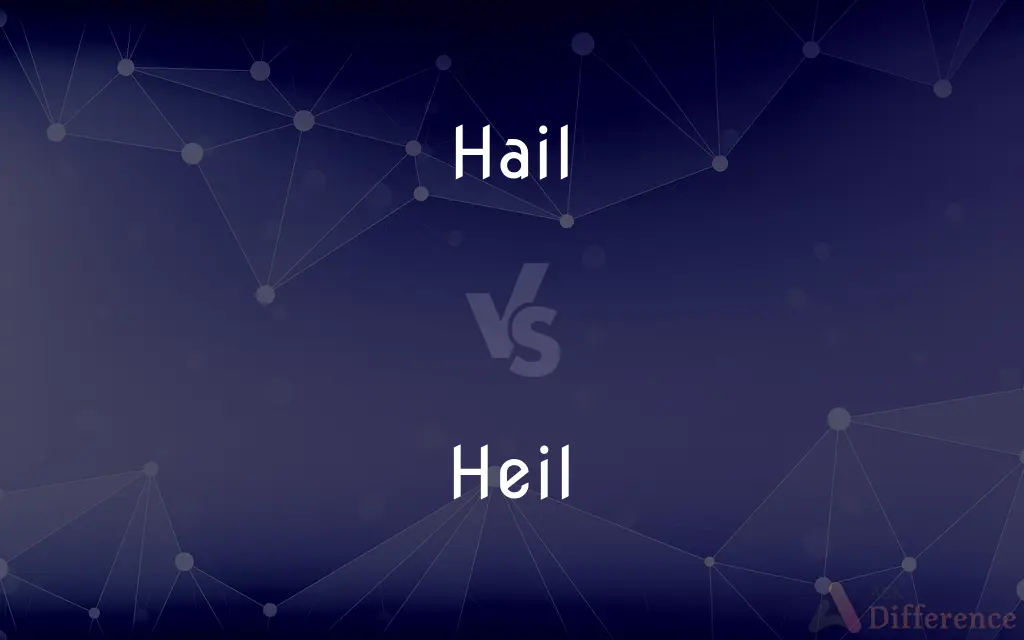Hail vs. Heil — What's the Difference?
Edited by Tayyaba Rehman — By Urooj Arif — Updated on April 16, 2024
"Hail" refers to precipitation of ice pellets, while "Heil" is a German salute used historically to express obedience or loyalty.

Difference Between Hail and Heil
Table of Contents
ADVERTISEMENT
Key Differences
Hail" typically denotes frozen raindrops that form pellets, creating a form of solid precipitation during storms. On the other hand, "Heil" is a German greeting or exclamation that gained notoriety during the Nazi era, primarily associated with the phrase "Heil Hitler."
In meteorology, hail occurs when updrafts in thunderstorms carry raindrops into extremely cold areas of the atmosphere, where they freeze into balls of ice. Whereas, in historical and cultural contexts, "Heil" was used as a salute involving raising the arm to shoulder height and expressing fealty to Adolf Hitler, symbolizing allegiance to his regime.
Hailstones vary in size from small pellets to golf ball-sized or larger and can cause significant damage to crops, vehicles, and buildings. In contrast, the use of "Heil" has been widely condemned due to its association with Nazi propaganda and ideology, leading to its strong negative connotations in modern contexts.
While hail is a natural phenomenon studied within the fields of weather and climate science, "Heil" is studied within historical, cultural, and political discussions, particularly in relation to World War II and the Holocaust.
The formation of hail involves natural meteorological processes and can be predicted to some extent by weather forecasts. Conversely, "Heil" as a salute is a human-created expression, reflecting specific socio-political beliefs and behaviors.
ADVERTISEMENT
Comparison Chart
Definition
Precipitation of ice pellets.
A German salute expressing loyalty.
Context
Meteorological
Historical/Cultural
Associated With
Thunderstorms, cold temperatures
Nazi Germany, Adolf Hitler
Connotations
Natural phenomenon, weather-related
Negative, linked to Nazism
Impact/Usage
Causes physical damage
Used symbolically in political contexts
Compare with Definitions
Hail
To greet or call attention to.
They hailed the returning heroes with cheers.
Heil
To salute or greet in German, particularly within a historical context.
The old film showed soldiers heiling their leader.
Hail
Frozen precipitation in the form of ice pellets.
The storm brought a severe hail that damaged many roofs.
Heil
Used to express obedience or loyalty, historically associated with Nazism.
The phrase Heil Hitler was compulsory at gatherings in Nazi Germany.
Hail
An enthusiastic greeting.
The winner received a hail of applause.
Heil
A form of greeting in historical Nazi Germany.
Heil was part of the official address in Nazi communications.
Hail
To originate from.
She hails from a small town in the Midwest.
Heil
A salute or gesture of obedience.
The use of the heil salute is banned in many countries today.
Hail
To signal or beckon.
He hailed a cab downtown.
Heil
To greet with a Sieg Heil.
Hail
Hail is a form of solid precipitation. It is distinct from ice pellets (American English "sleet"), though the two are often confused.
Hail
Precipitation in the form of spherical or irregular pellets of ice larger than 5 millimeters (0.2 inch) in diameter, usually associated with thunderstorms.
Hail
Something that falls with the force and quantity of a shower of ice and hard snow
A hail of pebbles.
A hail of criticism.
Hail
The act of greeting or acclaiming.
Hail
A shout made to catch someone's attention or to greet.
Hail
Hailing distance
Told me to stay within hail.
Hail
To precipitate in pellets of ice and hard snow.
Hail
To fall like hailstones
Condemnations hailed down on them.
Hail
To pour (something) down or forth
They hailed insults at me.
Hail
To salute or greet.
Hail
To greet or acclaim enthusiastically
The crowds hailed the boxing champion.
Hail
To call out or yell in order to catch the attention of
Hail a cabdriver.
Hail
To signal or call to a passing ship as a greeting or identification.
Hail
Used to express a greeting or tribute.
Hail
S or pieces of ice falling as precipitation, often in connection with a thunderstorm.
Hail
An occurrence of this type of precipitation; a hailstorm.
Hail
A rapid, intense barrage by a large number of projectiles or other objects.
Hail
(impersonal) Of hail, to fall from the sky.
They say it's going to hail tomorrow.
Hail
(intransitive) To send or release hail.
The cloud would hail down furiously within a few minutes.
Hail
To pour down in rapid succession.
Hail
(transitive) To greet; give salutation to; salute.
Hail
(transitive) To name; to designate; to call.
He was hailed as a hero.
Hail
(transitive) To call out loudly in order to gain the attention of.
Hail a taxi.
Hail
To indicate, from a designated stop or otherwise, to the driver of a public transport vehicle that one wishes to board and travel on the vehicle, usually using hand signals such as waving.
In Melbourne, you would usually have to hail a tram when you are travelling late at night and there are no other passengers waiting at your stop.
Hail
(transitive) To signal in order to initiate communication with.
Hail
(obsolete) Healthy, whole, safe.
Hail
An exclamation of respectful or reverent salutation, or, occasionally, of familiar greeting.
Hail
Small roundish masses of ice precipitated from the clouds, where they are formed by the congelation of vapor. The separate masses or grains are called hailstones.
Thunder mixed with hail,Hail mixed with fire, must rend the Egyptian sky.
Hail
A wish of health; a salutation; a loud call.
The angel hail bestowed.
Hail
To pour down particles of ice, or frozen vapors.
Hail
To pour forcibly down, as hail.
Hail
To call loudly to, or after; to accost; to salute; to address.
Hail
To name; to designate; to call.
And such a son as all men hailed me happy.
Hail
To declare, by hailing, the port from which a vessel sails or where she is registered; hence, to sail; to come; - used with from; as, the steamer hails from New York.
Hail
To report as one's home or the place from whence one comes; to come; - with from.
Hail
Healthy. See Hale (the preferable spelling).
Hail
An exclamation of respectful or reverent salutation, or, occasionally, of familiar greeting.
Hail
Precipitation of ice pellets when there are strong rising air currents
Hail
Enthusiastic greeting
Hail
Praise vociferously;
The critics hailed the young pianist as a new Rubinstein
Hail
Be a native of;
She hails from Kalamazoo
Hail
Call for;
Hail a cab
Hail
Greet enthusiastically or joyfully
Hail
Precipitate as small ice particles;
It hailed for an hour
Common Curiosities
What is hail made of?
Hail is made of layers of ice formed by the repeated freezing of water droplets in a thunderstorm's updrafts.
How does hail form?
Hail forms when strong updrafts carry raindrops into extremely cold areas of the atmosphere where they freeze.
What are the typical sizes of hailstones?
Hailstones can range from pea-sized to larger than a golf ball.
Is it legal to use "Heil" in a salute today?
In many countries, using "Heil" in a salute is illegal due to laws against promoting Nazi ideology.
What does "Heil Hitler" mean?
"Heil Hitler" was a greeting used to express loyalty to Adolf Hitler, often accompanied by a salute.
What historical period is "Heil" associated with?
"Heil" is primarily associated with Nazi Germany during the era of Adolf Hitler.
What damages can hail cause?
Hail can cause extensive damage to crops, vehicles, buildings, and glass structures.
Why is "Heil" considered offensive?
"Heil" is considered offensive due to its strong associations with Nazi ideology and the atrocities of World War II.
Can hail be predicted?
Meteorologists can predict conditions likely to produce hail but cannot predict the exact occurrence and size of hailstones.
Is "Heil" used in any positive context today?
Due to its negative historical associations, "Heil" is not used in positive contexts and is generally avoided.
Share Your Discovery

Previous Comparison
Coconut vs. Cocoa
Next Comparison
Continuity vs. InfinityAuthor Spotlight
Written by
Urooj ArifUrooj is a skilled content writer at Ask Difference, known for her exceptional ability to simplify complex topics into engaging and informative content. With a passion for research and a flair for clear, concise writing, she consistently delivers articles that resonate with our diverse audience.
Edited by
Tayyaba RehmanTayyaba Rehman is a distinguished writer, currently serving as a primary contributor to askdifference.com. As a researcher in semantics and etymology, Tayyaba's passion for the complexity of languages and their distinctions has found a perfect home on the platform. Tayyaba delves into the intricacies of language, distinguishing between commonly confused words and phrases, thereby providing clarity for readers worldwide.
















































